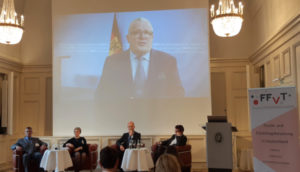
The Russian attack on Ukraine has once again brought the dramatic consequences of flight and displacement to public attention. The cross-border refugee movement from Ukraine is the fastest growing since the Second World War – and yet it is only one of many massive refugee crises of the last three decades.
Against this backdrop, the German Development Institute / Deutsches Institut für Entwicklungspolitik (DIE), on behalf of the joint project „Refugee and Refugee Research: Networking and Transfer“ (FFVT), organised a Parliamentary Evening on 12 May 2022 on the topic of „Germany’s handling of global flight and displacement: How to proceed with resettlement and humanitarian admission?“, which focused in particular on the refugee situation from Ukraine. The event was under the patronage of the Parliamentary State Secretary to the Federal Minister of Education and Research, Dr. h.c. Thomas Sattelberger. Among the guests were members of parliament and staff of the Bundestag, spokespersons for refugee and migration policy of the political parties and officials from relevant ministries.
Short presentations by academics from the FFVT network opened the discussion. Dr Franck Düvell (Institute for Migration Research and Intercultural Studies, Osnabrück) provided background information on Ukrainian society and general scenarios on the integration and return intentions of Ukrainian refugees in Germany and the European Union. Prof. Dr. Viktoriya Sereda (Institute of Ethnology at the National Academy of Sciences of Ukraine and Imre Kertész Kolleg in Jena) presented initial survey results on the needs and expectations of this refugee group. Prof. Dr. Conrad Schetter (Bonn International Centre for Conflict Studies) addressed trends in global refugee dynamics and emphasised, among other things, that a paradigm shift towards a discussion of the potentials and needs of refugees is necessary.
A central point of the lively discussion was the question of the appropriate time and extent of integration of Ukrainian children into the German care and school system. From an academic perspective, the experts agreed that the quickest possible integration was central, since structuring routines were important for the development of children and, moreover, all experiences with comparable flight situations led to worries that many refugees would not be able to return quickly. However, the discussion also touched on the special nature of the flight situation from Ukraine: Unlike in many civil wars in the recent past, there is a legitimate government that is being recognised by the refugees and with which Germany and the EU can and must discuss return, resettlement and integration issues within the framework of existing international obligations.
With this event, FFVT contributed to highlighting the relevance of multidisciplinary and diverse research on forced migration and refugees in Germany, which can help political decision-makers to meet the challenges linked to flight and displacement in the best possible informed way.

Schreibe einen Kommentar